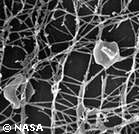Wednesday, August 23, 2006
Archaea: Revealing the earth's secrets
 In biology textbooks the world over you can read about how important bacteria in the soil are for plants and animals. Now the textbooks might have to be rewritten.
In biology textbooks the world over you can read about how important bacteria in the soil are for plants and animals. Now the textbooks might have to be rewritten.
The textbooks tell us namely that there are two types of nitrifying bacteria which account for all the oxidisation of ammonia (NH3) into nitrite (NO2) and subsequently into nitrate (NO3). It turns out that these bacteria are probably much less important in the nitrogen cycle than previously assumed. Instead, it appears that most of this job may be done by a completely different type of micro-organism: archaea.
Professor Christa Schleper of the Department of Biology at the University of Bergen, Norway, is a specialist in archaea, and she is behind this discovery, which may prove expensive for the textbook publishers. A lot of research remains to be done, however - archaea is namely a type of organism about which little has so far been known.
--
The above is based on the 'Letter to Nature' "Archaea predominate among ammonia-oxidizing prokaryotes in soils".
At the time of writing both the Summary and Full Text (via link on the Summary page) are available.
technorati tags: biology, textbooks, bacteria, soil, plants, ammonia, nitrite, nitrate, nitrogen, cycle, micro-organism, archaea, university, bergen, norway, discovery, nature, prokaryotes
Add to: CiteUlike | Connotea | Del.icio.us | Digg | Furl | Newsvine | Reddit | Yahoo